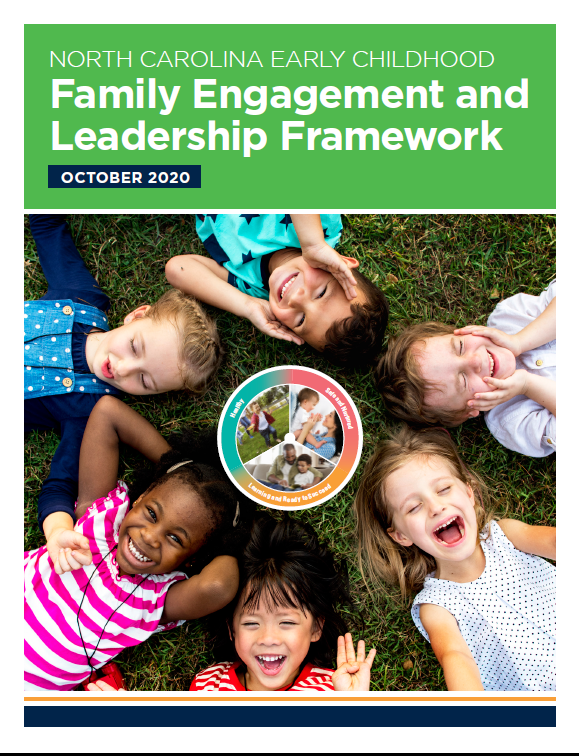Children grow and learn within the context of their family. When organizations that serve children and families authentically partner with families, both the family and organization are enriched, and services are more impactful. North Carolina is working to enhance family engagement across early childhood sectors through strong collaborations and tools. The North Carolina Division of Child Development and Early Education (DCDEE) and its partners are pleased to introduce the North Carolina Family Engagement and Leadership Framework to guide this work.
Early childhood is an exciting and challenging adventure. Family engagement has helped me feel connected and supported while I navigated the first years of life for our two youngest kids. Being a part of FELC allowed me to see just how much work goes into supporting families around our state. I appreciate the opportunity to be a part of the work and show organizational leaders that what is being done with families is working, and needs to continue with even more parent input.
Allison Boyd, Parent Leader
Johnston County, NC
 In 2019, the State Family Engagement and Leadership Coalition was formed as a 74-person coalition of NC early childhood providers from both state and local levels, as well as parents. This cross-sector group met consistently over six months to develop and refine the guiding principles and concepts featured in NC’s Family Engagement and Leadership Framework, developed to guide improvement practices as well as policy and systems change to support early childhood systems that are family-centered and equitable, serving children in the context of their families and communities.
In 2019, the State Family Engagement and Leadership Coalition was formed as a 74-person coalition of NC early childhood providers from both state and local levels, as well as parents. This cross-sector group met consistently over six months to develop and refine the guiding principles and concepts featured in NC’s Family Engagement and Leadership Framework, developed to guide improvement practices as well as policy and systems change to support early childhood systems that are family-centered and equitable, serving children in the context of their families and communities.
The Family Engagement and Leadership Framework defines and identifies important family engagement concepts to be applied across early childhood sectors and agencies. While its focus is ages birth to five, this Framework can be applied to the birth to eight age range and beyond, allowing for increased strategic alignment with initiatives such as NC’s Early Childhood Action Plan and Pathways to Grade-Level Reading. This Framework reflects both research and collective wisdom to ensure all children succeed through the strategy that works best – family engagement. It upholds the definition of family engagement as “doing with—not for—families” and the vision that agencies and programs align strategies to intentionally engage and learn from the adults in a child’s life. A Summary of the Framework is also available in English and Spanish.
This website is supported by Grant Number 90TP0133-01-00 from the Office of Early Childhood Development within the Administration for Children and Families, a division of the U.S. Department of Health and Human Services. Neither the Administration for Children and Families nor any of its components operate, control, are responsible for, or necessarily endorse this website (including, without limitation, its content, technical infrastructure, and policies, and any services or tools provided). The opinions, findings, conclusions, and recommendations expressed are those of the North Carolina Department of Health and Human Services and do not necessarily reflect the views of the Administration for Children and Families and the Office of Early Childhood Development.